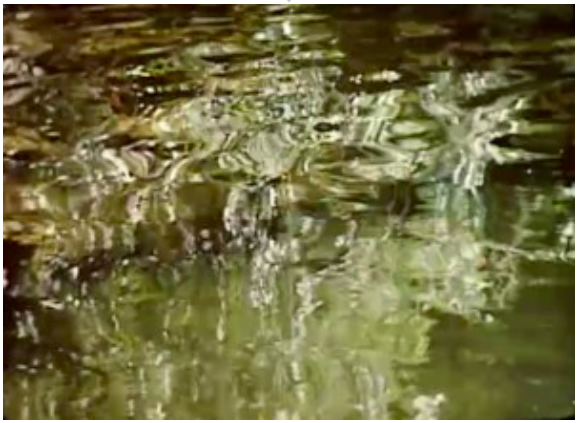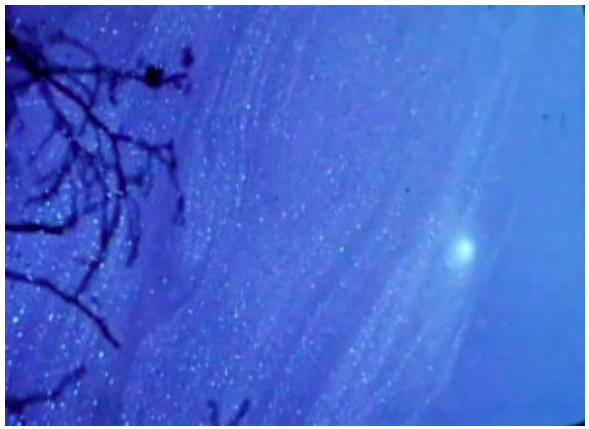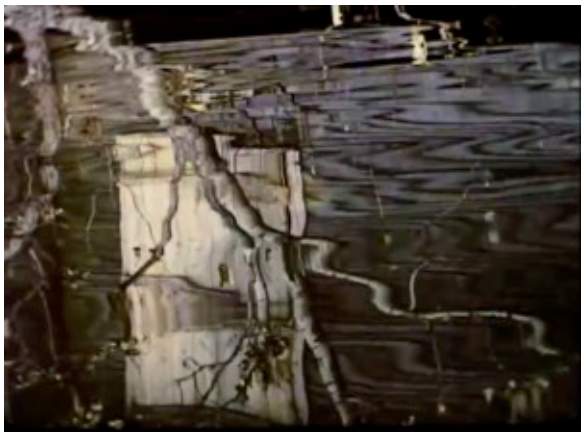The Flaherty Preservation Initiative
The Flaherty Preservation Initiative is an ongoing effort to preserve films presented at the Robert Flaherty Film Seminar. The project was initiated by former Flaherty board member Bill Brand.
Garden Roll Bounce Parking Lot
by Melissa Friedling
Melissa Friedling is a media artist, writer, and educator interested in the jumbled layers of media histories. Much of her work begins with found or ‘happened upon’ media that prompts an excavation of the marginalized and sometimes metaphysical narratives contained within them. Her films and videos have been exhibited internationally at venues including the Barbican Center (London, UK) Tribeca Film Festival (NY), PS1 MoMA (NY), Athens Institute for Contemporary Art (ATHICA), Hallwalls Contemporary Art Center (Buffalo), Art Space (New Haven), Microscope Gallery (NY); New Orleans International Film Festival, Ann Arbor (MI), Atlanta Film Festival.
Garden Roll Bounce Parking Lot showcases a garden in Brooklyn, NY that was utilizing a reel of a theatrically released movie, Roll Bounce, as a support for some of the plants. After the destruction of the garden to make way for a parking lot, the children of the parking lot owner take time to reminisce about its former beauty. A collage of sound, color, and found footage, Garden Roll Bounce Parking Lot presents a quiet nostalgia as told by a young Bangladeshi brother and sister.
Notes of an Early Fall
Saul Levine
In the mid-1970’s, when Saul Levine began experimentations with the unification of sound and moving image with his new Super 8mm sound camera, it marked a change from his previous silent works and a “fall” from the strict formality of producing moving image materials based purely on the visual. Notes of an Early Fall, a 32-minute Super 8mm sound film started a new chapter in Levine’s ongoing series of small gauge films titled Notes. The film plays a significant role in the history of Avant-Garde film more generally for its innovative exploration of montage through in-camera and post-production sound/image relationships in the Super 8mm sound format.
The film’s title, Notes of an Early Fall plays off three distinct references. Having recently lost his job at SUNY Binghamton film department, Levine returned home in the autumn season to celebrate the Jewish New Year, Rosh Hashanah with his family. With his new Super 8 sound camera he began experimentations with the unification of sound and moving image.
With Notes of an Early Fall, Levine utilizes patient minimalistic repetition both visually and aurally. He announces his formal rebellion early in the film with the first elongated shot of the film; a skipping warped LP. Subsequent shots are rapidly spliced, juxtaposing nervous animals pacing in cages, children playing freely in open spaces, and shots of a family matriarch preparing for a traditional Jewish Rosh Hashanah feast. The rapidly spliced shots, some of which feature prominent audio, and some of which are relatively quiet are jarring and powerful to experience. The film is stylistically radical and marks an important moment in Levine’s work and in small gauge experimental filmmaking more broadly.
Troublemakers
The preservation of Troublemakers was completed with the assistance of the students of New York University's Moving Image Archiving and Preservation graduate program (MIAP) in the Tisch School of the Arts and a grant from the National Film Preservation Foundation (NFPF).
Troublemakers by Norman Fruchter and Robert Machover
Norman Fruchter (1937-) and Robert Machover (1938-), created a small film production company Alpha 60 and would go on to become founding members of the Newsreel Collective (established in December 1967; later known as Third World Newsreel and California Newsreel).
Troublemakers premiered at the Fourth New York Film Festival in 1966, and was the first documentary ever to be shown at the prestigious Lincoln Center festival. It was subsequently screened at the Robert Flaherty Seminar in 1967. The film was praised critically by Cinema 16 founder and Flaherty Seminar friend, Amos Vogel, as well as Jonas Mekas, and Cineaste Magazine. In 1973 prominent mass media critic Todd Gitlin wrote that: “The best Left documentary I can think of is Fruchter and Machover's Troublemakers, whose fidelity to reality is so great that the film still holds up (though it was made in 1966). . . The ‘line’ of the film is not superimposed over scenic poverty, scenic powerlessness, but rather flows inductively from the observed reality. It is a film about experience, not about what experience is supposed to be by Left standards.”
Troublemakers, chronicles three months of community organizing in Newark, New Jersey’s Central Ward, a predominantly African-American neighborhood. The film focuses on the work of the Newark Community Union Project (NCUP), an initiative that grew out of Students for a Democratic Society (SDS) Economic Research and Action Project (ERAP). Troublemakers features residents and young activists banding together to get housing code enforced at a run-down building, organizing to pressure city officials to install traffic lights at a busy intersection and participating at a local political rally. Shot in cinema vérité style, Troublemakers presents an unflinchingly honest and frustrating account of a militant activist group’s activities. A major presence throughout the film is legendary activist, Thomas Hayden, who is known for authoring the founding document for Students for a Democratic Society, which launched the student movement of the 1960’s and for being one of the Chicago Eight defendants.
The film speaks to a variety of audiences and interest groups, including youth mobilization groups, social action centers, sociology students, researchers in history and political science, and film scholars. Troublemakers explores both racial and social inequality and the efforts to rectify it through social action, issues that are still in contention to this day.
Reflections by Madeline Tourtelot
The first preservation project, Reflections (1955) by Madeline Tourtelot, was completed in conjunction with graduate students in the Film Preservation class of New York University’s graduate Moving Image Archiving and Preservation program (MIAP), part of the Cinema Studies Department, Tisch School of the Arts and The Chicago Film Archives.
photo: The Peninsula School of Art
Madeline Tourtelot (1915-2002) was a prominent member of the Chicago fine arts scene of the 1950s and '60s, a student of Vladimir Rousseff at the Institute of Design in Chicago, co-founder of the Ephraim Art School and the Gallery Studio in the influential North Michigan Avenue arts district. She made a career as an avant-garde painter, photographer and filmmaker, later becoming a regular contributor to Film in Reviewand continuing her interest in education as the founder of the Peninsula Art School in Fish Creek, Wisconsin. Though she is perhaps best known for her series of films (1957-1969) made in collaboration with experimental composer Harry Partch, Tourtelot was already well-known in the avant-garde film community thanks to Reflections and its notable association with both the Robert Flaherty Film Seminar and Cinema 16, the influential New York-based film society.
Born into a musical family (her father was a concert pianist), Tourtelot was consistently interested in visual rhythm and musical subjects in her early works. In the fall of 1955, she created a series of thirteen short films set to classical music for Chicago's public educational channel, WTTW. One of these films, which would later become Reflections, was a series of images on a quiet pond set to Ravel's “Ma Mere L'Oye,” which caught the interest of Frances Flaherty, whom Tourtelot had become familiar with as a student attendant at the first-ever Flaherty Film Seminar in the summer of 1955.
Flaherty suggested that Tourtelot present the film at the second annual seminar in the summer of 1956 as part of a program studying the question of setting music to film. In preparation for the seminar, Tourtelot collaborated with jazz musician and composer Ed Bland (whose own short film The Cry of Jazz was named to the National Film Registry in 2010) to create a new score for the film, cutting it to the current, five-minute version now available. In 1955, Tourtelot also sent the earlier, longer draft of Reflectionsto Amos Vogel, co-founder and programmer of Cinema 16. Vogel expressed great interest in Tourtelot's work, and the final version of Reflections became one of the many influential experimental films distributed by Cinema 16.
Tourtelot's place in the history of avant-garde filmmaking has largely been reduced to that of a co-worker of Harry Partch. The preservation of Reflections would remind contemporary viewers of her rightful place as a productive and inventive artist in her own right, not just in the Chicago arts scene but on the national stage.
The Chicago Film Archives acquired this film in 2005 as a donation from the composer, Ed Bland. The Peninsula School of Art, the owner/executor of her personal archive and estate, has granted permission for CFA to preserve Reflections.
The preservation of Reflections is a collaboration between The Flaherty, Anne Wells, Collections Manager at Chicago Film Archives, Ethan Gates, second-year student in NYU-MIAP, and Bill Brand, NYU-MIAP professor of film preservation and owner/operator of BB Optics.








